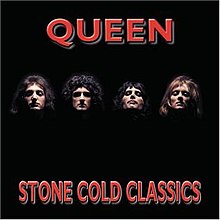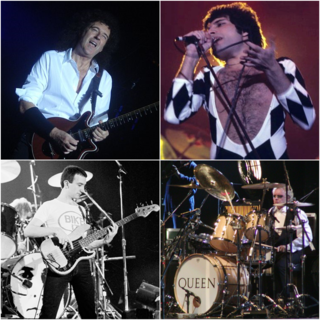
Queen are a British rock band formed in London in 1970 by Freddie Mercury, Brian May and Roger Taylor, later joined by John Deacon (bass). Their earliest works were influenced by progressive rock, hard rock and heavy metal, but the band gradually ventured into more conventional and radio-friendly works by incorporating further styles, such as arena rock and pop rock.

The Freddie Mercury Tribute Concert for AIDS Awareness was a benefit concert held on Easter Monday, 20 April 1992, at Wembley Stadium in London, United Kingdom, for an audience of 72,000. The concert was produced for television by Ray Burdis, directed by David Mallet and broadcast live on television and radio to 76 countries around the world, with an audience of up to one billion. The concert was a tribute to Queen's lead vocalist, Freddie Mercury, who died of AIDS on 24 November 1991.
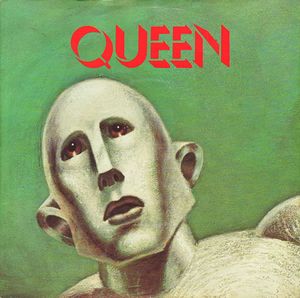
"We Are the Champions" is a song by the British rock band Queen, released from the band's sixth album News of the World (1977). Written by lead singer Freddie Mercury, it remains among rock's most recognisable anthems. The song was a worldwide success, reaching number two in the UK Singles Chart, number four on the Billboard Hot 100 in the US, number three in Canada and the top ten in many other countries. In 2009 it was inducted into the Grammy Hall of Fame and was voted the world's favourite song in a 2005 Sony Ericsson world music poll. In 2011, a team of scientific researchers concluded that the song was the catchiest in the history of popular music.

"Crazy Little Thing Called Love" is a song by the British rock band Queen. Written by Freddie Mercury in 1979, the track is included on their 1980 album The Game, and also appears on the band's compilation album Greatest Hits in 1981. The song peaked at number two in the UK Singles Chart in 1979, becoming the group's first number-one single on the Billboard Hot 100 in the US in 1980, remaining there for four consecutive weeks. It topped the Australian ARIA Charts for seven weeks. It was the band's final single release of the 1970s.

Sheer Heart Attack is the third studio album by the British rock band Queen, released on 8 November 1974 by EMI Records in the United Kingdom and by Elektra Records in the United States. Digressing from the progressive themes featured on their first two albums, the album featured more pop-centric and conventional rock tracks and marked a step towards the "classic" Queen sound. It was produced by the band and Roy Thomas Baker, and launched Queen to mainstream popularity in the UK and throughout the world.

A Night at the Opera is the fourth studio album by the British rock band Queen, released on 21 November 1975 by EMI Records in the United Kingdom and by Elektra Records in the United States. Produced by Roy Thomas Baker and Queen, it was reportedly the most expensive album ever recorded at the time of its release.

Innuendo is the fourteenth studio album by the British rock band Queen, released on 4 February 1991 by Parlophone in the United Kingdom and it is the band's first studio album to be released by Hollywood Records in the United States. Produced by David Richards and the band, it was the band's last album to be released in lead singer Freddie Mercury's lifetime, and their most recent one to be composed of entirely new material, save for The Cosmos Rocks by the Queen + Paul Rodgers collaboration. It reached the No. 1 spot on the UK album charts for two weeks, and also peaked at No. 1 in Italy, the Netherlands, Germany, and Switzerland, staying at No. 1 for three weeks, four weeks, six weeks, and eight weeks, respectively. It was the first Queen album to go Gold in the US upon its release since The Works in 1984.

Classic Queen is a 1992 compilation album by the British rock band Queen. The album is seen as a US version of Greatest Hits II and was issued to capitalise on the renewed popularity of Queen in the United States following the release of the movie Wayne's World and the death of Freddie Mercury. The album reached number four on the US Billboard 200 and is certified three times platinum in the US and five times platinum in Canada. Accumulated sales are in excess of 25 million worldwide.

"I Want to Break Free" is a song by the British rock band Queen, written by their bassist John Deacon. It appears on the album The Works (1984), and was released in three versions: album, single and extended. The track became a staple of the bands during their 1984–85 Works Tour and their 1986 Magic Tour.
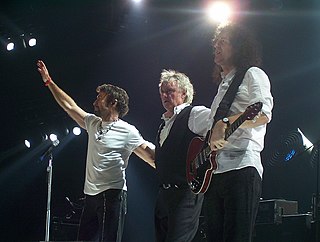
Queen + Paul Rodgers was a collaboration between Queen and Paul Rodgers, formerly of Bad Company, Free, The Firm and The Law. Guitarist May had previously performed with Rodgers on several occasions, including a performance at the Royal Albert Hall.
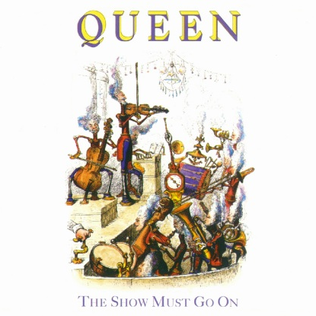
"The Show Must Go On" is a song by British rock band Queen, featured as the twelfth and final track on their 1991 album, Innuendo. It is credited to Queen, but written mainly by Brian May. The song chronicles the effort of frontman Freddie Mercury continuing to perform despite approaching the end of his life, although his diagnosis with HIV/AIDS had not yet been made public in spite of ongoing media speculation claiming that he was seriously ill. When the band recorded the song in 1990, Mercury's condition had deteriorated to the point that May had concerns as to whether he was physically capable of singing it. May recalls; "I said, 'Fred, I don't know if this is going to be possible to sing.' And he went, 'I'll fucking do it, darling'—vodka down—and went in and killed it, completely lacerated that vocal".
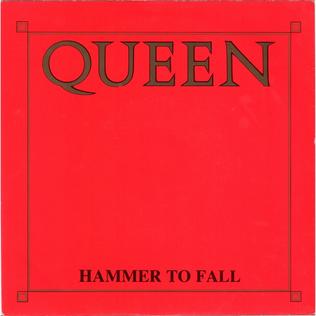
"Hammer to Fall" is a 1984 song by the British rock band Queen. Written by guitarist Brian May, the song is the eighth track on their 1984 album The Works. It was the fourth and final single to be released from that album, although the single version was edited down by thirty seconds from the version on the album. Different sleeves were used to package this single and the live picture sleeve is now a collector's item. The song harks back to the old roots of the band, being built around a hard angular and muscular riff.

"The Miracle" is the fifth and final single from Queen's 1989 studio album of the same name. It was composed by the entire band, though Freddie Mercury and John Deacon were the main writers. It was released as a single on 27 November 1989 and it was the band's final single release of the 1980s.

The Works is the eleventh studio album by the British rock band Queen. It was released on 27 February 1984 by EMI Records just shortly after recording for the album had been completed in the United Kingdom and it is the band's first studio album to be released by Capitol Records in the United States. After the synth-heavy Hot Space (1982), the album saw the re-emergence of Brian May and Roger Taylor's rock sound, while still incorporating the early 80s retro futuristic electronic music and New York funk scenes. Recorded at the Record Plant Studios in Los Angeles, California, and Musicland Studios in Munich, Germany, from August 1983 to January 1984, the album's title comes from a comment Taylor made as recording began – "Let's give them the works!".
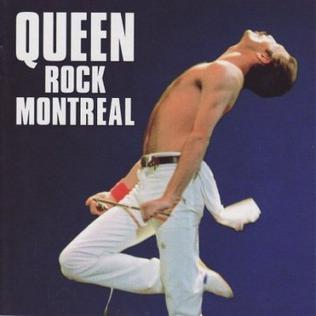
Queen Rock Montreal is a live album by the British rock band Queen. It was released on 29 October 2007 as a double CD, Blu-ray, DVD, and triple vinyl in the UK and the following day in the US.
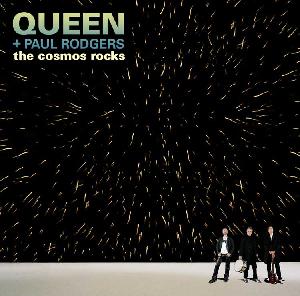
The Cosmos Rocks is the only studio album by Queen + Paul Rodgers, released on 15 September 2008. It contains 14 new tracks written by Brian May, Roger Taylor, and Paul Rodgers. This is the first studio album of new material from the two remaining members of Queen since 1995's Made in Heaven.
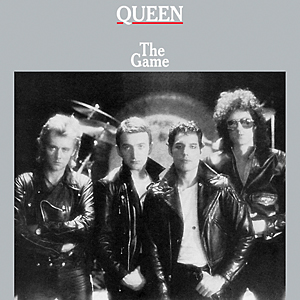
The Game is the eighth studio album by the British rock band Queen. It was released on 30 June 1980 by EMI Records in the UK and by Elektra Records in the US. The Game features a different sound from its predecessor, Jazz (1978). The Game was the first Queen album to use a synthesizer.
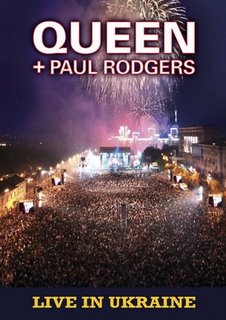
Live in Ukraine is a double live album and video and also last release by British rock collaboration Queen + Paul Rodgers. It was recorded in September 2008 during the Rock the Cosmos Tour at Freedom Square in Kharkiv, Ukraine and was released on 15 June 2009. A companion DVD was also released.

Hungarian Rhapsody: Queen Live in Budapest is a concert film of the British rock band Queen's performance at the Népstadion in Budapest on 27 July 1986. It was part of the band's final tour with original lead singer Freddie Mercury, The Magic Tour. Queen were one of the few bands from Western Europe to perform in the Eastern Bloc during the Cold War. The film had a limited theatrical release in Eastern Bloc countries in 1987/1988 and worldwide on 20 September 2012. The concert was released on VHS and Laserdisc in the UK and Japan on 16 February 1987 under the original title Queen Live In Budapest, and on DVD and Blu-ray for the first time on 5 November 2012 worldwide, except in the United States where it was released a day later. The concert title is a play on the Hungarian Rhapsodies by Franz Liszt and one of Queen's most celebrated hits, "Bohemian Rhapsody".
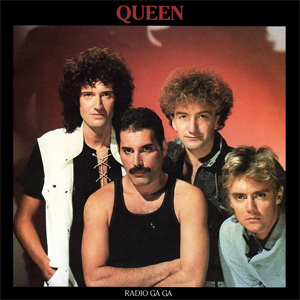
"Radio Ga Ga" is a 1984 song performed and recorded by the British rock band Queen, written by their drummer Roger Taylor. It was released as a single with "I Go Crazy" by Brian May as the B-side. It was included on the album The Works and is also featured on the band's compilation albums Greatest Hits II and Classic Queen.
